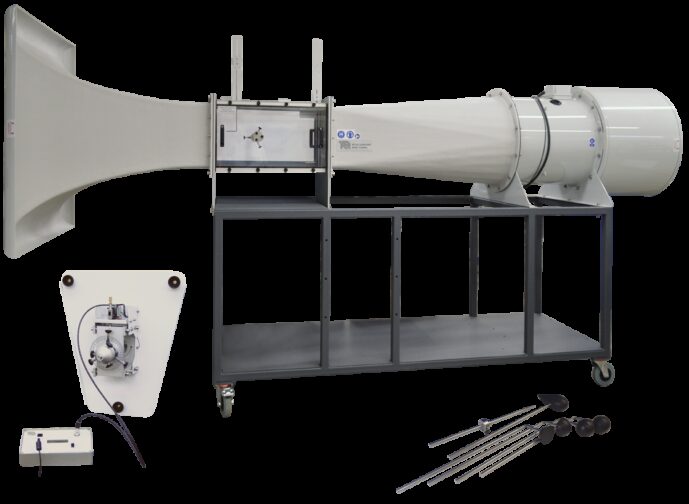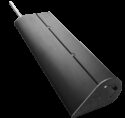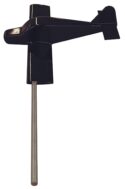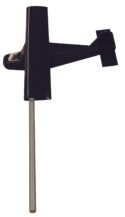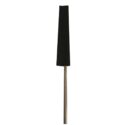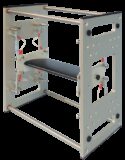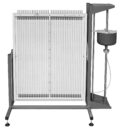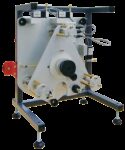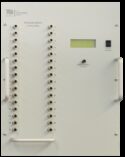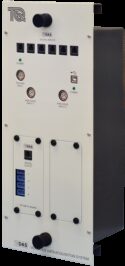Package
AF1300S

SUBSONIC WIND TUNNEL 300mm
An open circuit suction subsonic wind tunnel with a working section of 300 mm by 300 mm and 600 mm long.
If you have any questions or you'd like to discuss a product, please call us.
+44 1159 722 611SUBSONIC WIND TUNNEL 300mm
The complete starter set includes TecQuipment’s Subsonic Wind Tunnel (AF1300), the Basic Lift and Drag Balance (AF1300Z) and the Three-dimensional Drag Models (AF1300J) - all parts needed for experiments in aerodynamic drag.
The Wind Tunnel (AF1300)
This compact wind tunnel provides accurate results and is suitable for undergraduate study and research projects. TecQuipment offers a range of additional and optional models and instrumentation to extend the experiments, including a data acquisition system (VDAS®).
Air enters the tunnel through an aerodynamically designed effuser (cone) that accelerates the air linearly. It then enters the working section and passes through a grill before moving through a diffuser and then to a variable-speed axial fan. The grill protects the fan from damage by loose objects. The air leaves the fan, passes through a silencer unit and then back out to atmosphere.
A separate control and instrumentation unit controls the speed of the axial fan (and the air velocity in the working section). The control and instrumentation unit also includes manometers and electrical outlets to supply electrical power to other optional instruments.
The working section of the tunnel is a square section with a clear roof, sides and floor. The sides are removable. The floor and each side panel has a special position to support the optional wind tunnel models. Supplied with the wind tunnel are a protractor and a model holder to support and accurately adjust the angle of any models fitted. Two traversing probes fit on the working section. One is a Pitot-static tube and the other a standard Pitot tube. They fit upstream and downstream of any models and connect to the manometers of the instrumentation unit (or other optional instruments) to show pressure.
A metal frame supports the wind tunnel. The frame includes lockable castors for convenient mobility. Optional wind tunnel instruments can connect to TecQuipment’s Versatile Data Acquisition System (VDAS®, not included). VDAS® allows accurate real-time data capture, monitoring, display, calculation and charting of all relevant parameters on a suitable computer.
The Basic Lift and Drag Balance (AF1300Z)
A simple-to-fit balance that mounts on the side of the wind tunnel working section. This balance holds the models in the working section and measures the lift and drag forces on the models, created by the air moving past them. The balance also works with other optional models.
The balance includes a digital display unit to show the forces. The display can connect to TecQuipment’s VDAS® to log experiment data on a suitable computer.
The Three-dimensional Drag Models (AF1300J)
A set of models, each with a different shape featuring the same frontal area for direct comparisons. The models fit in the wind tunnel working section, held by the balance to allow students to see how shape affects aerodynamic drag. The models include ‘classic’ aerodynamic test shapes including a smooth sphere, a dimpled sphere and a streamline shape.
Experiments
This Starter Set includes parts for experiments in three dimensional drag due to different body shapes and surface dimples.
Learning outcomes
TecQuipment can also supply other optional models and instruments to extend experiments, including:
- Flow past bluff and streamlined bodies with pressure and velocity observations in the wake
- Investigations into boundary layer development
- Influence of aspect ratio on aerofoil performance
- Performance of an aerofoil with flap, influence of flap angle on lift, drag and stall
- Pressure distribution around a cylinder under sub and super-critical flow conditions
- Study of characteristics of models involving basic measurement of lift and drag forces
- Study of the characteristics of three-dimensional aerofoils involving measurement of lift, drag and pitching moment
- Study of the pressure distribution around an aerofoil model to derive the lift and comparison with direct measurements of lift
- Flow visualisation

